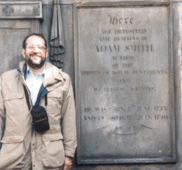(p. A20) Unfortunately, the deniers of differences between the sexes are on the march with powerful allies. In the fall of 2006, the National Academy of Sciences released a recklessly one-sided study, now widely referred to as authoritative, titled "Beyond Bias and Barriers: Fulfilling the Potential of Women in Academic Science and Engineering." According to the report, differences in cognition between the sexes have no bearing on the dearth of women in academic math, physics and engineering. It is all due to bias. Case closed. The report calls on Congress to hold hearings on gender bias in the sciences and on federal agencies to "move immediately" (emphasis in original) to apply anti-discrimination laws such as Title IX to academic science (but not English) departments. "The time for action is now."
No it is not. Now is the time for scholars in our universities and in the National Academy of Sciences to defend and support principles of free and objective inquiry. The chronically appalled must not have the last word.
For the full commentary, see:
Christina Hoff Sommers. "Academic Inquisitors." Wall Street Journal (Tues., Oct. 16, 2007): A.20.
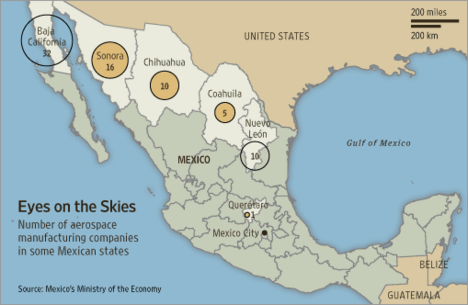 Source of map: online version of the WSJ article quoted and cited below.
Source of map: online version of the WSJ article quoted and cited below.
(p. A2) Mexico has felt the downside of globalization in recent years as cheaper Asian manufacturers of everything from electronics to auto parts have undercut the advantages provided by looser North American trade barriers.
Now, Mexican officials are turning to another sector they hope will put down deeper roots: The booming North American aerospace industry.
Mexico has moved to make it even easier for foreign companies to do business south of the border. Already, big names in aerospace such as Goodrich Corp. of the U.S. and Bombardier Inc. of Canada have set up facilities there.
The nation offers proximity and easy reach at a time when aerospace giants are under pressure to hit deadlines and deliver new aircraft to customers. Aerospace officials also say they are impressed by Mexico's deep talent pool. And if Mexico successfully bolsters its aerospace industry, it will demonstrate that skills burnished servicing the automotive sector can be transferred to higher-end industries.
. . .
Mexico's biggest advantage may be its location. For years, major aerospace manufacturers such as Boeing Co. have farmed out a growing share of their work to suppliers in Japan, China and elsewhere. But these arrangements can make it a challenge to get finished components back to the companies' main factories for final assembly. The choice often boils down to waiting weeks for delivery by ship or paying for costly space on a cargo jet.
With demand for new jetliners and other aircraft at record levels, however, companies are under greater pressure to cut shipping time and increase production. Many U.S. aerospace companies already have built up considerable capacity in Mexico to feed the industry's production hub in Southern California.
For the full commentary, see:
JOEL MILLMAN and J. LYNN LUNSFORD. "THE OUTLOOK; Mexico Seeks a Lasting Share Of Aerospace Boom." The Wall Street Journal (Mon., November 26, 2007): A2.
(Note: ellipsis added.)
The passage below is from a WSJ summary of an article that appeared in the December 2007 issue of Discover:
(p. B12) Scientists are increasingly hopeful that controlling inflammation will allow them to turn back the clock on aging, writes Kathleen McGowan in Discover magazine.
Inflammation is already a well-established predictor of many chronic illnesses, such as diabetes, atherosclerosis and Alzheimer's disease. . . .
. . .
Many prominent gerontologists reason that if these chronic diseases are the product of an overactive immune system, then they can be countered with the right anti-inflammatory drug. . . .
"The research is really to prevent the chronic debilitating diseases of aging," says Nir Barzilai, a molecular geneticist and director of the Institute for Aging Research at the Albert Einstein College of Medicine in New York. "But if I develop a drug, it will have a side effect, which is that you will live longer."
For the full summary, see:
"The Informed Reader; Health; How Scientists Hope to Shrink Aging Effects." Wall Street Journal (Weds., Nov. 14, 2007): B12.
(Note: ellipses added.)
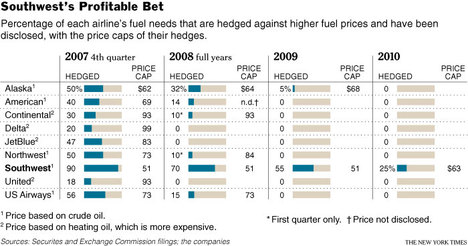 Source of graphic: online version of the NYT article quoted and cited below.
Source of graphic: online version of the NYT article quoted and cited below.
(p. C1) Southwest Airlines, in danger for much of this year of losing its quirky dominance in the domestic airline industry, could soon be standing, once again, head and shoulders above the competition.
Better service? Happier and more productive workers?
Not this time. The reason for Southwest's rapidly increasing advantage over other big airlines is much simpler: it loaded up years ago on hedges against higher fuel prices. And with oil trading above $90 a barrel, most of the rest of the airline industry is facing a huge run-up in costs, and Southwest is not.
Southwest owns long-term contracts to buy most of its fuel through 2009 for what it would cost if oil were $51 a barrel. The value of those hedges soared as oil raced above $90 a barrel, and they are now worth more than $2 billion. Those gains will mostly be realized over the next two years.
Other major airlines passed on buying all but the shortest-term insurance against high fuel prices, allowing Southwest executives a bit of schadenfreude.
For the full story, see:
JEFF BAILEY. "An Airline Shrugs at Oil Prices." The New York Times (Thurs., November 29, 2007): C1 & C10.
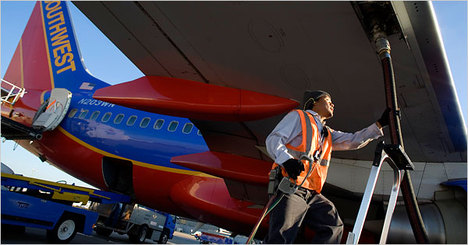
'A Southwest Airlines worker fueled a plane. Southwest's chief said the hedges against rising fuel costs "bought us time to retool our company."" Source of caption and photo: online version of the NYT article quoted and cited above.
The author of the lines quoted below won the Nobel Prize in economics in 2002.
(p. A20) The joint housing and mortgage-market crisis once again reminds us that all financial implosions stem from the same cause: borrowing short and lending long without enough equity to weather periodic storms in the gap between.
But this bubble was different. Besides being fueled by housing purchases and repackaged loans, each with inadequate equity -- doubling down with other people's money -- at the end of the capital-gains rainbow was the right to take up to $500,000 of profit, tax free.
Thank you President Bill Clinton for your 1997 action, applauded by the banks, the realtors and all citizens in search of half-millionaire status from an investment they could understand and self deceptively believe to be low risk; thank you for fueling the mother of all housing bubbles; thank you for enabling so many of us who bought second or third homes, and homes before construction began, which we then sold to someone else who dreamed of riches from owning homes long enough to sell to another fool.
Once again, try as we might and in spite of our political rhetoric, we have failed to help the poor in applauding government action intended to help ourselves.
For the full commentary, see:
VERNON L. SMITH. "The Clinton Housing Bubble." The Wall Street Journal (Tues., December 18, 2007): A20.
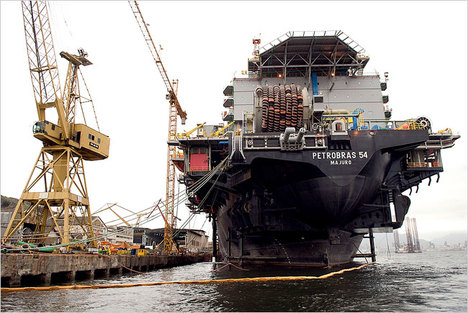 "The Petrobras 54 platform was in Niteroi, Brazil, last August, before its deployment." Source of the caption and the photo: online version of the NYT article quoted and cited below.
"The Petrobras 54 platform was in Niteroi, Brazil, last August, before its deployment." Source of the caption and the photo: online version of the NYT article quoted and cited below.
(p. C1) RIO DE JANEIRO -- While some of the world's largest oil producers, including Mexico and Iran, are struggling to remain exporters, Brazil is moving in the opposite direction. A huge underwater oil field discovered late last year has the potential to transform South America's largest country into a sizable exporter and win it a seat at the table of the world's oil cartel.
The new oil, along with refining projects under way by Petrobras, the national oil company, could eventually make Brazil a larger exporter of gasoline as well, adding to supplies in the United States and other countries where it is all but impossible to build new refineries.
The subsalt basin that contains Tupi, the new deepwater field estimated to hold the equivalent of five billion to eight billion barrels of light crude oil, is creating a buzz among the world's largest oil companies. They have struggled lately to find global-scale projects worth investing in, even with oil touching $100 a barrel. Tupi is the world's biggest oil find since a 12-billion-barrel field discovered in 2000 in Kazakhstan.
For the full story, see:
ALEXEI BARRIONUEVO. "Hot Prospect for Oil's Big League." The New York Times (Fri., January 11, 2008): C1 & C4.
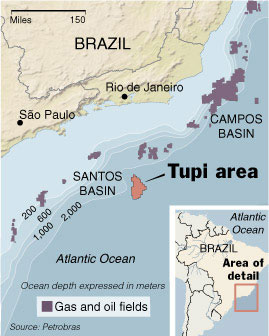
"The Tupi deepwater field." Source of the caption and the map: online version of the NYT article quoted and cited above.
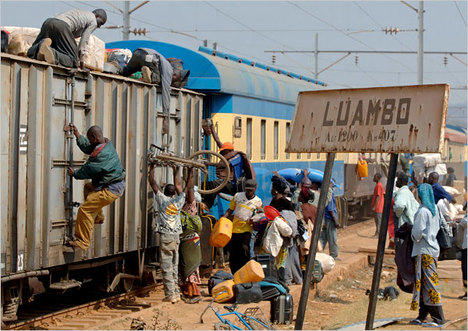 "A crowded train traveling through Katanga Province. Goods and people are crammed in, and bathrooms are used for storage." Source of caption and photo: online version of the NYT article quoted and cited below.
"A crowded train traveling through Katanga Province. Goods and people are crammed in, and bathrooms are used for storage." Source of caption and photo: online version of the NYT article quoted and cited below.
(p. A4) In large swaths of Congo, a vast country the size of Western Europe, roads are impassable or nonexistent, large riverboats no longer ply the waterways and air travel is prohibitively expensive, leaving many people to rely on an increasingly dangerous railway system long past its prime.
Fresh from its first democratic elections in nearly 50 years and still struggling to emerge from civil war, Congo is trying to get its trains running again. But it has a long way to go.
. . .
The bathrooms in first class become filthy soon after a trip begins. In second and third class, the bathrooms are used for storage. In one car, five large bags of charcoal were stuffed into a bathroom, and people relieved themselves in buckets or out windows.
The railway employs over 13,000 people, but the last time paychecks were sent out was in May, and that was payment for the spring of 2005. So many employees do not go to work, and bribes are widespread.
"Sometimes it's difficult to resist temptations," said Agustín, the police chief at the Kamina station, who gave only his first name. "I do bad things."
"I haven't been paid in 29 months," he added. "How am I supposed to send my children to school?"
Léon, a conductor and machinist who gave only his first name, thinks the problem begins in Kinshasa, the capital. "This is a state-owned company," he said. "It's bankrupt because of the government. The way things are going, we won't last two years."
For the full story, see:
WILL CONNORS. "Congo by Rail: Filthy, Crowded and Dangerous." The New York Times (Tues., September 4, 2007): A4.
(Note: ellipsis added.)
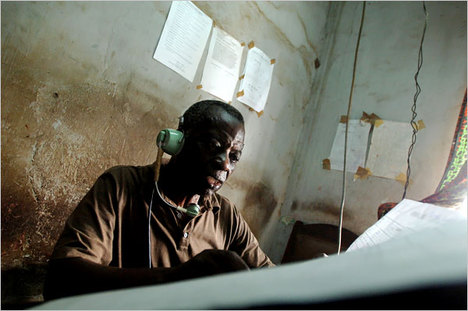 "A train controller relays the position of a train to another station. Because pay is so infrequent, many employees do not go to work and bribes are widespread." Source of caption and photo: online version of the NYT article quoted and cited above.
"A train controller relays the position of a train to another station. Because pay is so infrequent, many employees do not go to work and bribes are widespread." Source of caption and photo: online version of the NYT article quoted and cited above.
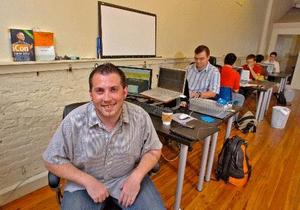
"Web entrepreneur Alex Hillman got together with a group of work-at-home businesspeople to create a hip space to work in Philadelphia." Souce of caption and photo: online version of the Omaha World-Herald article quoted and cited below.
(p. 1D) "I always felt an obligation to the coffee shop. I was taking up precious space," Hillman said. "I was definitely drinking more coffee than I should have, so I wasn't sleeping."
Even before he left his job, he had begun to learn about co-working, not to be confused with job-sharing, where two people take turns in the same stall in the cube farm.
Instead, think of co-working as an entrepreneurial version of parallel play, with owners of their own small businesses working side by side in a drop-in place that looks like a coffee cafe, minus the barista, with all the accoutrements of what's hip: high ceilings, beer fridge, pool table and Internet access.
Paying as little as $175 a month, they mostly work on their own. But they also trade ideas, help solve problems, and move in and out of loose collaborations.
Today's technology -- wireless access, cell phones, BlackBerries and laptops -- makes a mobile work force possible.
"I think when people work at home they have to come up with new ways to interact with people," said Daniel H. Pink, one of the first authors to write about independent contractors in his 2001 book "Free Agent Nation."
For the full story, see:
THE PHILADELPHIA INQUIRER. "Workplace; A step up from working in pj's." Omaha World-Herald (Monday, September 17, 2007): 1D & 2D.
The refererence to the Pink book is:
Pink, Daniel H. Free Agent Nation: How America's New Independent Workers Are Transforming the Way We Live. New York: Warner Business Books, 2001.
PTG said:
How can we be certain that these dismal consequences are 'unintended'?
Nate said:
I think this analysis is right on.
Nate said:
Interesting data...
Notice that the US has a moderate "religiosity" rating, and yet the highest reported per capita GDP. Also note that Europe was at one time more "religious," which is not accounted for in the graph. Africa has a very high "religiosity" rating and practically no per cap. GDP. These numbers can be made highly consistent by thinking of "religion" as just a "part of" a worldvew. Everyone has a worldview. A worldview is simply the way in which a person views the world. A worldview could be thought of as a foundation for one's life. Science and religion are some of the main ingredients in the "cement." If any any one of the ingredients is not input in the right way and the right amount in the cement making process, a weak foundation will be built. Each ingredient of the cement is critical and dependent on every other ingredient. The problem is not religion or science, the problem is that societies repeatedly build weak foundations, some not even lasting long enough to start the structure's framing. The founders of America were highly and openly religious and yet they built a foundation unparalleled in strength; freedom and prosperity like never before seen in modern time resulted. If America's foundation continues to be pounded on, it will one day crumble like the rest.
Aaron said:
Tomorrow I need to present an article to my Economic Justice class (in which a guest speaker, lamenting the meager pay of elementary teachers, suggested Congress determine the salary of occupations by a vote) on the disparate access to health care. I am using this article in combination with the Rockefeller / scarlett fever story you told our class.
Michael David Todaro said:
In his December 13th article, “In a Funk, Italy Sings an Aria of Disappointment” Ian Fisher quotes Rome’s mayor Walter Veltroni as saying that Italy is “…a country that has lost a little of its will for the future.”
I believe the mayor could have expressed his sentiments in more precise terms.
I do not believe that Italy has lost its will for the future, nor do I believe that Italy has lost its will at all. However, I do believe that Italy may have temporarily misplaced it. I suspect that, like a prize fighter, Italy has taken a few more blows to the head in the past few years than would be considered “within comfortable limits” and is feeling the effects of fatigue. I also believe that this feeling will not endure.
Italy has had a long tradition of being the “come-back kid.” Over the centuries the peninsula and surrounding islands have been conquered, liberated, conquered again and united. Since the early days of the Roman Empire, Italy has seen economic depressions and great losses, but these adversities–both periodic and finite–have resulted in a country that is both proud and strong, rich in history and culture.
I also applaud and at the same time, chastise Ian Fisher for the preciseness of his article’s title. There is a reason why Italy sings both arias of joy and despair: because it can. Because it created the medium in the first place. Ian Fisher chose his metaphor with precision but perhaps his intent might be aided with a somewhat more substantive definition of what an aria really is:
An aria is but a short song sung by a single voice. It is a small part of a much larger and greater operatic work that only reflects the individual character’s emotional state. It does not, however, represent the entire opera, nor does it necessarily portray the emotions of “all” of the characters in the opera itself.
For the opera to work, other voices need to sing, and other songs need to be sung.
I cannot say who the “individual” was who sang this particular aria, but I do not believe it is at all accurate to call the character “Italy.” Italy sings with more than just one voice, so it could not have possibly sung the aria that Ian Fisher describes. This aria, then, more accurately represents a single individual or entity, and the opera in which it is contained may tell an altogether different story.
I doubt that the entire opera has even been written yet.
I would surmise, therefore, that this oeuvre is far from over.
Michael David Todaro
PTG said:
Taleb is a bit of a Black Swan himself. Most cats are suspicious of empiricism, but can't explain why. Plato never allowed for luck.










